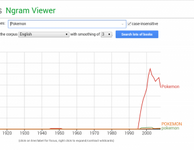C
Carol Rose
Guest
I came across this today in my RWA (Romance Writers of America) newsfeed. You need to be an RWA member to access the link to the article, but in it she talks about using computational linguistics when researching historical fiction.
Here are the sites she references in the article:
https://books.google.com/ngrams
The Google Ngram Viewer can help you track a word or phrase’s frequency over time. Knowing when particular slang was popular can help your dialogue and prose sound authentic. Slang often appeared in print years after people used it in speech.
https://books.google.com
Google Ngram Viewer uses text from Google Books. If you want to check out a phrase in context, you can search for it in Google Books. Click the Search Tools button on the right. There’s a drop-down menu under “Any time,” which lets you limit the results to a custom time range. This feature will give you options to use for slang from the time period in which you're writing.
http://www.etymonline.com
If you want to dig deeper and research the origins of a word or phrase, this site will help.
Here are the sites she references in the article:
https://books.google.com/ngrams
The Google Ngram Viewer can help you track a word or phrase’s frequency over time. Knowing when particular slang was popular can help your dialogue and prose sound authentic. Slang often appeared in print years after people used it in speech.
https://books.google.com
Google Ngram Viewer uses text from Google Books. If you want to check out a phrase in context, you can search for it in Google Books. Click the Search Tools button on the right. There’s a drop-down menu under “Any time,” which lets you limit the results to a custom time range. This feature will give you options to use for slang from the time period in which you're writing.
http://www.etymonline.com
If you want to dig deeper and research the origins of a word or phrase, this site will help.


